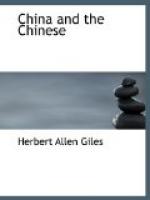Four or five years later Wen T’ien-hsiang attracted attention by demanding the execution of a statesman who had advised that the Court should quit the capital and flee before the advance of the victorious Mongols. Then followed many years of hard fighting, in the course of which his raw levies were several times severely defeated, and he himself was once taken prisoner by the Mongol general, Bayan, mentioned by Marco Polo. He managed to escape on that occasion; but in 1278 the plague broke out in his camp, and he was again defeated and taken prisoner. He was sent to Peking, and every effort was made to induce him to own allegiance to the Mongol conqueror, but without success. He was kept several years in prison. Here is a well-known poem which he wrote while in captivity:—
“There is in the universe an Aura, an influence which permeates all things, and makes them what they are. Below, it shapes forth land and water; above, the sun and the stars. In man it is called spirit; and there is nowhere where it is not.
“In times of national tranquillity, this spirit lies hidden in the harmony which prevails. Only at some great epoch is it manifested widely abroad.”
Here Wen T’ien-hsiang recalls, and dwells lovingly upon, a number of historical examples of loyalty and devotion. He then proceeds:—
“Such is this grand and glorious spirit which endureth for all generations; and which, linked with the sun and moon, knows neither beginning nor end. The foundation of all that is great and good in heaven and earth, it is itself born from the everlasting obligations which are due by man to man.
“Alas! the fates were against me; I was without resource. Bound with fetters, hurried away toward the north, death would have been sweet indeed; but that boon was refused.
“My dungeon is lighted by the will-o’-the-wisp alone: no breath of spring cheers the murky solitude in which I dwell. The ox and the barb herd together in one stall: the rooster and the phoenix feed together from one dish. Exposed to mist and dew, I had many times thought to die; and yet, through the seasons of two revolving years, disease hovered around me in vain. The dark, unhealthy soil to me became Paradise itself. For there was that within me which misfortune could not steal away. And so I remained firm, gazing at the white clouds floating over my head, and bearing in my heart a sorrow boundless as the sky.
“The sun of those dead heroes has long since set, but their record is before me still. And, while the wind whistles under the eaves, I open my books and read; and lo! in their presence my heart glows with a borrowed fire.”
At length, Wen T’ien-hsiang was summoned into the presence of Kublai Khan, who said to him, “What is it you want?” “By the grace of his late Majesty of the Sung dynasty,” he replied, “I became his Majesty’s minister. I cannot serve two masters. I only ask to die.” Accordingly he was executed, meeting his death with composure, and making a final obeisance toward the south, as though his own sovereign was still reigning in his capital.




